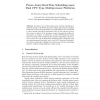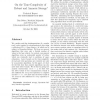119
click to vote
OPODIS
2008
15 years 3 months ago
2008
We consider asynchronous deterministic broadcasting in radio networks. An execution of a broadcasting protocol is a series of events, each of which consists of simultaneous transm...
128
click to vote
OPODIS
2008
15 years 3 months ago
2008
Abstract Nowadays, most of the energy-aware real-time scheduling algorithms belong to the DVFS (Dynamic Voltage and Frequency Scaling) framework. These DVFS algorithms are usually ...
121
Voted
OPODIS
2008
15 years 3 months ago
2008
This paper presents an asynchronous implementation of a failure detector for unknown and mobile networks. Our approach does not rely on timers. Neither the composition nor the numb...
114
click to vote
OPODIS
2008
15 years 3 months ago
2008
Abstract. Consensus is a fundamental building block used to solve many practical problems that appear on reliable distributed systems. In spite of the fact that consensus is being ...
116
Voted
OPODIS
2008
15 years 3 months ago
2008
Kleinberg [17] proposed in 2000 the first random graph model achieving to reproduce small world navigability, i.e. the ability to greedily discover polylogarithmic routes between a...
129
click to vote
OPODIS
2008
15 years 3 months ago
2008
We consider wait-free implementations of a regular read/ write register for unauthenticated data using a collection of 3t + k base objects, t of which can be subject to Byzantine ...
101
click to vote
OPODIS
2008
15 years 3 months ago
2008
Abstract. We consider the following model of cellular networks. Each base station has a given finite capacity, and each client has some demand and profit. A client can be covered b...
115
Voted
OPODIS
2008
15 years 3 months ago
2008
The process number is the minimum number of requests that have to be simultaneously disturbed during a routing reconfiguration phase of a connection oriented network. From a graph ...
106
Voted
OPODIS
2008
15 years 3 months ago
2008
Probabilistic quorum systems can tolerate a larger fraction of faults than can traditional (strict) quorum systems, while guaranteeing consistency with an arbitrarily high probabi...
106
Voted
OPODIS
2008
15 years 3 months ago
2008
In this paper, we study the atomic multicast problem, a fundamental abstraction for building faulttolerant systems. In the atomic multicast problem, the system is divided into non...


